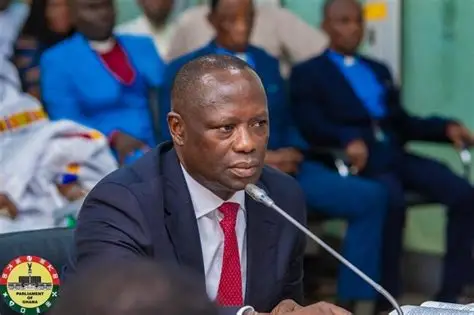Declare rivers and forests security zones
Ghana’s government announces a major crackdown on illegal mining by declaring river bodies and forest reserves as national security zones.

Ghana Declares War on Galamsey: Rivers and Forests to Become Security Zones
In a decisive move to safeguard Ghana’s natural environment, the Lands and Natural Resources Minister, Emmanuel Armah-Kofi Buah, has announced a groundbreaking policy. Consequently, the government will soon declare all river bodies and forest reserves as national security zones. This bold initiative represents a significant escalation in the nation’s fight against the devastating effects of illegal mining, commonly known as galamsey.

A Firm Stance Against Environmental Degradation
Firstly, the decision underscores the government’s renewed commitment to a challenge that has plagued the country for years. Illegal mining operations have relentlessly polluted vital water sources, decimated lush forest covers, and destroyed fertile agricultural lands.
Therefore, this new security designation aims to create an enforceable legal barrier around these critical ecosystems. Essentially, the government is drawing a line in the sand, signaling that the destruction must stop immediately.
Operationalizing the Security Zones
So, what does this declaration mean in practical terms? Minister Buah’s announcement indicates a move towards a more robust, multi-agency approach. Subsequently, security personnel will be empowered to restrict and monitor access to these designated zones. Furthermore, any mining activity within these protected areas will be treated as a national security threat. This approach will likely involve increased patrols, the use of technology for surveillance, and stricter penalties for violators. As a result, the government hopes to dismantle the machinery and networks that enable illegal mining to thrive.
The Implications for Communities and the Nation
Moreover, this policy has far-reaching implications for local communities and the nation’s future. On one hand, it promises the restoration and protection of water bodies that millions depend on for drinking, farming, and sanitation. On the other hand, it necessitates a just transition for those whose livelihoods are currently tied to illegal mining. Importantly, the government has concurrently emphasized the need to promote and support responsible, small-scale mining practices. Ultimately, the goal is to balance environmental protection with sustainable economic opportunities for citizens.
Conclusion: A Crucial Step Forward
In conclusion, the declaration of river bodies and forest reserves as security zones is a pivotal and welcome step in Ghana’s environmental conservation efforts. While the implementation will undoubtedly present challenges, the clear message is one of resolve. The government, by taking this firm action, is prioritizing the long-term health of the nation over short-term, destructive gains. The success of this measure, however, will hinge on consistent enforcement and continued public support in the fight to preserve Ghana’s natural heritage for generations to come.



